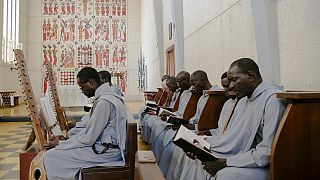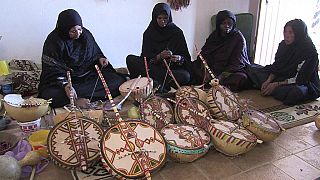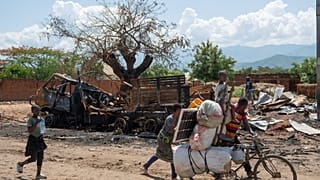Sudan
Sudan's Wazza instrument ushers in the harvest season. This traditional instrument comes from Sudan's Blue Nile southern state and has been used for generations.
The sound of traditional Sudanese instrument Wazza fills the air in the streets of Khartoum.
The horn-like instrument has been used in Sudan for generations to usher in the harvest season.
Mohamed Adam Soliman is a music professor at Sudan's University of Science and Technology: He tells us about the origins of this instrument.
"It's a man-made instrument in the Blue Nile state by the ethnic Funj group, either the Barta, or Albroon, or the Gumuz and many other communities in the area. It (the Wazza instrument, ed.) is an outcome of the environment. It's made from the gourd in a long, rectangular or cylindrical shape which is planted in a specific way", he said.
The instrument comes from Sudan's southern Blue Nile state. Instruments can vary in size, with some as long as two metres.
In the village of East Ganis, in Blue Nile State, Youssef Moussa Ismail, is a traditional Wazza maker.
"The instrument is made from the gourd which is cultivated at the beginning of the rainy season. As it grows, we pound a stake into the ground and then place a canopy of tree branches and dry grass on top for the gourd to grow and climb. We are now making a new Wazza from the newly (cultivated, ed.) gourd, because it has to be re-made every year as (the instrument, ed.) wears out due to being subjected to water and humidity. So we must make new ones every year", said Moussa Ismail.
Wazza players perform in a band of up to 13 members.
Some players also use animal horns to tap their Wazza to create rhythms.













01:01
Sudan's transitional leader al-Burhan holds talks with Saudi Crown Prince in Riyadh
02:19
Researchers find evidence of youngest-ever children tattooed
00:49
Eritrea announces departure from IGAD regional bloc
01:14
UK sanctions four senior RSF commanders over atrocities in Sudan
02:01
Sudan: RSF capture of Heglig threatens South Sudan's oil exports
00:30
Global humanitarian crisis worsens, UN seeks $23 Billion for 2026